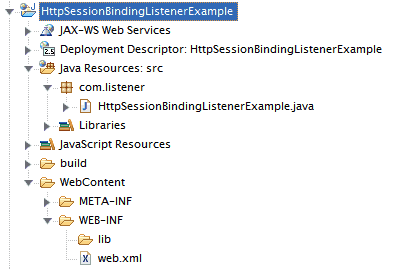HttpSessionBindingListener Example

HttpSessionBindingListener Example explains about how to use HttpSessionBindingListener in a web application.
The listener HttpSessionBindingListener is an interface extending from base interface java.util.EventListener interface. This interface will notify an object when it is bound to or unbound from a session.
javax.servlet.http.HttpSessionBindingListener interface has following two methods:
valueBound(HttpSessionBindingEvent event). valueUnBound(HttpSessionBindingEvent event).
You can see the below example, which is demonstrating HttpSessionBindingListener Example
Package Structure

web.xml
<?xml version="1.0" encoding="UTF-8"?> <web-app xmlns:xsi="http://www.w3.org/2001/XMLSchema-instance" xmlns="http://java.sun.com/xml/ns/javaee" xmlns:web="http://java.sun.com/xml/ns/javaee/web-app_2_5.xsd" xsi:schemaLocation="http://java.sun.com/xml/ns/javaee http://java.sun.com/xml/ns/javaee/web-app_2_5.xsd" version="2.5"> <listener> <listener-class>com.listener.HttpSessionAttributeListenerExample</listener-class> </listener> </web-app>
HttpSessionBindingListenerExample.java
package com.listener;
import javax.servlet.*;
import javax.servlet.http.*;
public class HttpSessionBindingListenerExample implements HttpSessionBindingListener {
ServletContext context;
public HttpSessionBindingListenerExample(ServletContext context) {
this.context = context;
}
public void valueBound(HttpSessionBindingEvent event) {
context.log("The value bound is " + event.getName());
}
public void valueUnbound(HttpSessionBindingEvent event) {
context.log("The value unbound is " + event.getName());
}
}
import javax.servlet.*;
import javax.servlet.http.*;
public class HttpSessionBindingListenerExample implements HttpSessionBindingListener {
ServletContext context;
public HttpSessionBindingListenerExample(ServletContext context) {
this.context = context;
}
public void valueBound(HttpSessionBindingEvent event) {
context.log("The value bound is " + event.getName());
}
public void valueUnbound(HttpSessionBindingEvent event) {
context.log("The value unbound is " + event.getName());
}
}
Invoke HttpSessionListener From Servlet
// Get the current session object, create one if necessary
HttpSession session = req.getSession();
// Add a HttpSessionBindingListenerExample
session.setAttribute("name",new HttpSessionBindingListenerExample(getServletContext()));
session.removeAttribute("name");
HttpSessionBindingListenerExample.java
package com.listener;
import javax.servlet.*;
import javax.servlet.annotation.WebListener;
import javax.servlet.http.*;
@WebListener
public class HttpSessionBindingListenerExample implements HttpSessionBindingListener {
ServletContext context;
public HttpSessionBindingListenerExample() {
}
public HttpSessionBindingListenerExample(ServletContext context) {
this.context = context;
}
public void valueBound(HttpSessionBindingEvent event) {
System.out.println("The value bound is " + event.getName());
}
public void valueUnbound(HttpSessionBindingEvent event) {
System.out.println("The value unbound is " + event.getName());
}
}
import javax.servlet.*;
import javax.servlet.annotation.WebListener;
import javax.servlet.http.*;
@WebListener
public class HttpSessionBindingListenerExample implements HttpSessionBindingListener {
ServletContext context;
public HttpSessionBindingListenerExample() {
}
public HttpSessionBindingListenerExample(ServletContext context) {
this.context = context;
}
public void valueBound(HttpSessionBindingEvent event) {
System.out.println("The value bound is " + event.getName());
}
public void valueUnbound(HttpSessionBindingEvent event) {
System.out.println("The value unbound is " + event.getName());
}
}
ListenerServletExample.java
package com.listener;
import java.io.IOException;
import java.io.PrintWriter;
import javax.servlet.ServletException;
import javax.servlet.annotation.WebServlet;
import javax.servlet.http.HttpServlet;
import javax.servlet.http.HttpServletRequest;
import javax.servlet.http.HttpServletResponse;
import javax.servlet.http.HttpSession;
/**
* This servlet is used for showing an example about sessionListener
*/
@WebServlet("/ListenerServletExample")
public class ListenerServletExample extends HttpServlet {
private static final long serialVersionUID = 1L;
public void doGet(HttpServletRequest request, HttpServletResponse response) throws ServletException, IOException {
HttpSession session = request.getSession(); //sessionCreated() method is invoked
session.setAttribute("name",new HttpSessionBindingListenerExample(getServletContext()));
session.removeAttribute("name");
PrintWriter out = response.getWriter();
out.append("Session Created Successfully");
}
}
import java.io.IOException;
import java.io.PrintWriter;
import javax.servlet.ServletException;
import javax.servlet.annotation.WebServlet;
import javax.servlet.http.HttpServlet;
import javax.servlet.http.HttpServletRequest;
import javax.servlet.http.HttpServletResponse;
import javax.servlet.http.HttpSession;
/**
* This servlet is used for showing an example about sessionListener
*/
@WebServlet("/ListenerServletExample")
public class ListenerServletExample extends HttpServlet {
private static final long serialVersionUID = 1L;
public void doGet(HttpServletRequest request, HttpServletResponse response) throws ServletException, IOException {
HttpSession session = request.getSession(); //sessionCreated() method is invoked
session.setAttribute("name",new HttpSessionBindingListenerExample(getServletContext()));
session.removeAttribute("name");
PrintWriter out = response.getWriter();
out.append("Session Created Successfully");
}
}
Tomcat Console Output
The value bound is name The value unbound is name